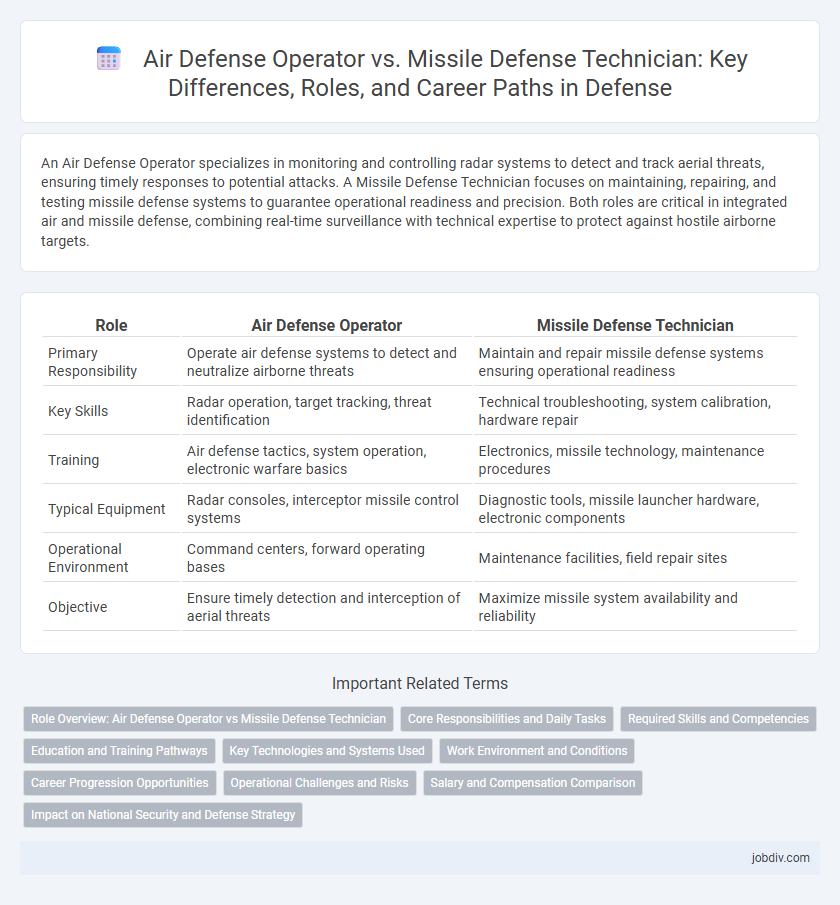An Air Defense Operator specializes in monitoring and controlling radar systems to detect and track aerial threats, ensuring timely responses to potential attacks. A Missile Defense Technician focuses on maintaining, repairing, and testing missile defense systems to guarantee operational readiness and precision. Both roles are critical in integrated air and missile defense, combining real-time surveillance with technical expertise to protect against hostile airborne targets.
Table of Comparison
| Role | Air Defense Operator | Missile Defense Technician |
|---|---|---|
| Primary Responsibility | Operate air defense systems to detect and neutralize airborne threats | Maintain and repair missile defense systems ensuring operational readiness |
| Key Skills | Radar operation, target tracking, threat identification | Technical troubleshooting, system calibration, hardware repair |
| Training | Air defense tactics, system operation, electronic warfare basics | Electronics, missile technology, maintenance procedures |
| Typical Equipment | Radar consoles, interceptor missile control systems | Diagnostic tools, missile launcher hardware, electronic components |
| Operational Environment | Command centers, forward operating bases | Maintenance facilities, field repair sites |
| Objective | Ensure timely detection and interception of aerial threats | Maximize missile system availability and reliability |
Role Overview: Air Defense Operator vs Missile Defense Technician
Air Defense Operators are responsible for detecting, tracking, and engaging aerial threats using radar systems and surface-to-air missile platforms to protect airspace security. Missile Defense Technicians specialize in maintaining, testing, and repairing missile systems, ensuring operational readiness and system reliability for intercepting ballistic threats. Both roles require advanced technical skills, but operators focus on real-time threat engagement, while technicians concentrate on system maintenance and hardware functionality.
Core Responsibilities and Daily Tasks
Air Defense Operators focus on monitoring radar systems, identifying potential aerial threats, and coordinating response efforts to ensure airspace security. Missile Defense Technicians specialize in maintaining, testing, and repairing missile systems, ensuring operational readiness and accuracy of missile defense equipment. Both roles require precise communication and technical expertise but differ in direct system operation versus equipment maintenance and troubleshooting.
Required Skills and Competencies
Air Defense Operators require expertise in radar systems, threat detection, and communication protocols to identify and counter aerial threats effectively. Missile Defense Technicians must possess advanced technical skills in missile system maintenance, electronic diagnostics, and weapons system integration to ensure operational readiness. Both roles demand strong situational awareness, quick decision-making abilities, and proficiency in using specialized defense technology for national security.
Education and Training Pathways
Air Defense Operators typically undergo specialized training in radar operations, target tracking, and command control systems, often starting with military technical schools or enlisted training programs. Missile Defense Technicians receive advanced education focusing on missile system maintenance, electronics, and weapons integration, usually requiring formal technical certifications or completion of defense-specific technical courses. Both roles emphasize ongoing professional development, but Missile Defense Technicians generally pursue more extensive technical education to handle complex missile technologies and diagnostics.
Key Technologies and Systems Used
Air Defense Operators specialize in radar systems, command and control interfaces, and surface-to-air missile platforms such as the Patriot and S-400, ensuring real-time threat detection and engagement coordination. Missile Defense Technicians focus on the maintenance and operation of missile interceptors, electronic warfare countermeasures, and guidance systems, including Aegis Combat System and THAAD. Both roles utilize advanced sensor fusion technologies and secure communication networks to protect airspace from hostile aerial threats.
Work Environment and Conditions
Air Defense Operators perform in high-stress control rooms, monitoring radar systems and coordinating interceptor aircraft in real-time to neutralize aerial threats, often working extended shifts in dimly lit environments. Missile Defense Technicians operate on-site with missile systems, frequently in outdoor or confined spaces, handling maintenance and launch preparations under variable weather conditions and strict safety protocols. Both roles demand precision under pressure but differ in work setting intensity--operators focus on surveillance and command centers, while technicians engage in hands-on technical and mechanical tasks in field or launch site environments.
Career Progression Opportunities
Air Defense Operators typically advance by gaining expertise in radar systems, tactical command, and integrated air defense network management, leading to roles such as Air Defense Systems Supervisor or Tactical Operations Center Supervisor. Missile Defense Technicians progress by deepening their skills in missile launch systems, guidance technology, and warhead maintenance, enabling promotions to positions like Missile Systems Supervisor or Technical Control Specialist. Both career tracks offer pathways to senior technical roles, command positions, and specialized training in evolving defense technologies.
Operational Challenges and Risks
Air Defense Operators face continuous operational challenges such as real-time threat detection, rapid target identification, and seamless coordination with radar and command systems to intercept aerial threats effectively. Missile Defense Technicians encounter complex risks involving the maintenance and deployment of advanced missile systems, requiring precise technical expertise to prevent malfunctions or accidental launches. Both roles demand high-stress decision-making environments with critical implications for national security and require rigorous training to mitigate operational errors and maximize defense capabilities.
Salary and Compensation Comparison
Air Defense Operators typically earn an average annual salary ranging from $45,000 to $60,000, with compensation influenced by rank and deployment status. Missile Defense Technicians generally receive higher base salaries, often between $55,000 and $70,000, reflecting advanced technical training and the complexity of missile systems management. Both roles offer benefits such as hazard pay, housing allowances, and bonuses, but Missile Defense Technicians may access additional specialized incentives tied to critical defense operations.
Impact on National Security and Defense Strategy
Air Defense Operators play a critical role in national security by monitoring and controlling airspace to identify and respond to aerial threats, ensuring rapid decision-making for immediate defense actions. Missile Defense Technicians specialize in maintaining and operating missile systems designed to intercept and neutralize incoming ballistic threats, directly enhancing strategic deterrence capabilities. Both positions are vital for integrated defense strategies, with Operators providing real-time tactical air threat management and Technicians ensuring the operational readiness and effectiveness of missile interception systems.
Air Defense Operator vs Missile Defense Technician Infographic

 jobdiv.com
jobdiv.com